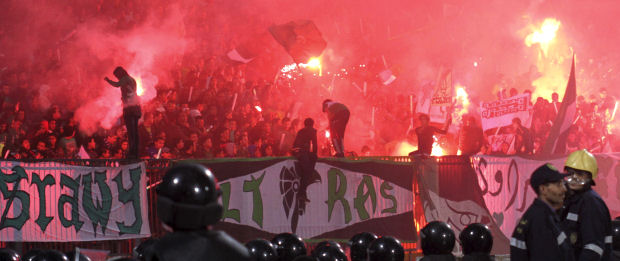Clashes in Cairo over Egypt football riot
There has been widespread anger in Egpyt after 74 people died in football violence. As Jonathan Rugman reports, conspiracy theories abound about how the tragedy could have happened.

Fans of the Port Said club al-Masry invaded the pitch after the home team’s 3-1 victory over al-Ahly, Egypt’s best-known club side. 74 people died in the ensuing violence. Eyewitnesses reported fans being pushed to their deaths from upper tiers of the stadium, while others were stabbed or died of suffocation in the stampede to escape.
On Thursday the governor of Port Said resigned, while board members of Egypt’s football association were not only sacked, but referred to prosecutors for questioning.
Some alleged the violence was connected to a political power struggle inside Egypt in the aftermath of last year’s political revolution that saw the toppling of former president Hosni Mubarak.
The appearance of Egypt’s military ruler, Field Marshal Mohamed Hussein Tantawi, on television shortly after the violence occurred is thought to be significant. Field Marshal Tantawi, who ordered two helicopters to be sent to Port Said to help fly some of the injured to hospital, also made a rare appearence at Cairo airport to greet the clearly bewildered Cairo team on its return. But in parliament on Thursday MPs lined up to accuse the military of plotting to upset the transition to democracy by allowing the violence to take place.
Hardcore football supporters – known as Ultras – from al-Ahly and Cairo rivals Zamalek – organised marches in the capital to protest. Clashes broke out, with demonstrators made a direct connection between alleged police negligence and Egypt’s military rulers. Late on Thursday tear gas was deployed at traditional flashpoints around the interior ministry to keep protestors back.
Larger demonstrations are expected on Friday.
Earlier crowds of had gathered at the Ramses train station in downtown Cairo to meet al-Ahly fans returning from Port Said (see image below).
A series of joint marches by Ultras – hard-core football supporters – are planned for today in protest at last night’s events. The first is due to converge on Egypt’s parliament, followed by marches to the interior and defence ministries.

‘The lights went off’
Home fans reportedly armed with sticks and knives stormed the pitch after the final whistle. TV film shows an apparently concerted movement of fans towards where the away supporters are gathered.
Reports suggest some al-Ahly fans suffocated when they were trapped in a narrow corridor as they fled the violence. TV footage from the match shows the stadium lights being turned off at one point.
We went to the tunnel and the doors were shut with chains. Al-Ahly supporter
“They said to us, we have brought your funeral shrouds with us,” one al-Ahly fan who was at the match told the Reuters news agency. “And then we were attacked horribly. And then we went to the tunnel and the doors were shut with chains. That’s the first thing.
“And the lights were shut off. They were firing rubber bullets. I swear to God, I saw people who were being thrown off the stadium steps.”
Al-Ahly’s Portuguese coach, Manuel Jose, who has returned to Portugal, told his club’s website: “I was beaten with fists and kicks to the neck, head and feet. I saw our fans die before us and we are unable to do anything.”
Egyptian sports coverage showed shocked commentators hanging their heads as the scenes of carnage played out before them.
‘Black day for football’
Fifa, world football’s governing body, has demanded a full report into the violence.
Fifa said in a statement: “Fifa has asked the Egyptian authorities for a full report on the incidents in order to evaluable what happened.”
In a letter to the president of the Egyptian FA, Fifa President Sepp Blatter wrote: “Today is a black day for football and we must take steps to ensure that such a catastrophe never happens again.
“Football is a force for good and we must not allow it to be abused by those who mean evil. I await further news from you concerning the circumstances of this tragedy.”
